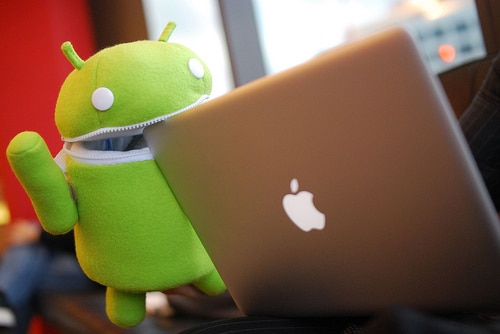
The Android sceptics may be right – 80 percent of paid Android apps have clocked fewer than 100 downloads, according to Distimo research. Free apps are more popular – only 25 percent of them weighed in with fewer than 100 downloads.
Distimo says: “It is more challenging for developers in the Google (NSDQ: GOOG) Android Market than in the Apple (NSDQ: AAPL) App Store to monetize using a one-off fee monetization model. We found that only two paid applications have been downloaded more than half a million times in the Google Android Market worldwide to date, while six paid applications in the Apple App Store for iPhone generate the same number of downloads within a two month timeframe in the United States alone (Beautiful Widgets and Robo Defense).”
-
Only 96 Android apps have been downloaded more than five million times – the top one being Google Maps (50 million downloads), which on many handsets is set to auto-download updates.
- “There are five games in Google Android Market with over 250,000 downloads worldwide. In the Apple App Store for iPhone ten games generated more than 250,000 downloads in the United States alone in two months.”
- Even “the majority (51.8%) of free applications have been downloaded less than 1,000 times to date.”
-
Poor turnover – “During the month of April, there were 94 distinct applications with a top 10 (free or paid) position in the Apple App Store for iPhone in the US; there were only 26 distinct applications that reached a top 10 position in the Google Android Market.”
So, while iTunes Store sells billions of apps, Android Market is a mainly free ecosystem. That means developers should be more inclined to offer free apps with built-in monetisation methods, like advertising or in-app payments.
I’ll make an important caveat here – Android Market has a longer tail, if you like, of poor, single-developer apps that receive no marketing and hence no attention. This could skew the percentage figures – but it doesn’t excuse the specific low figures Distimo is seeing.
The recent introduction of in-app Android payments may help. But, until Google can figure out more ways to encourage people to open a Google Checkout account, in to which is plugged their credit card number, it will be playing catch-up to Apple, whose own store started as a music retailer and now offers multiple things, not just apps, to buy.
The quality of some of those apps is also a factor, of course.
